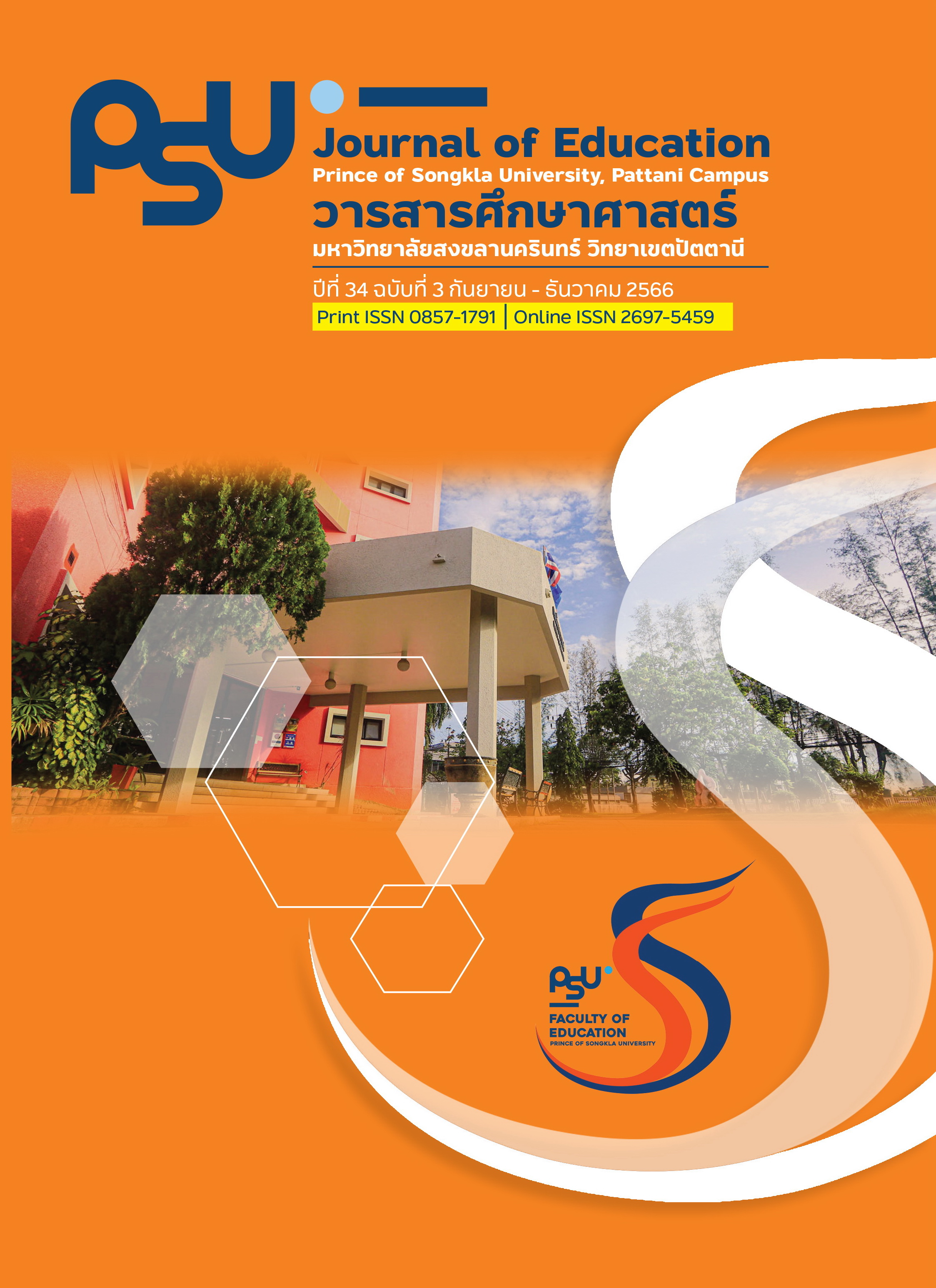การใช้แบบฝึกทักษะภาษาอังกฤษผ่านระบบการจัดการเรียนการสอน เพื่อพัฒนาทักษะภาษาอังกฤษของนักศึกษาระดับมหาวิทยาลัยภายใต้สถานการณ์การระบาดไวรัสโควิด-19
Main Article Content
บทคัดย่อ
งานวิจัยนี้มีวัตถุประสงค์เพื่อ 1) ศึกษาผลการฝึกทักษะภาษาอังกฤษผ่านระบบการจัดการเรียนการสอนของนักศึกษาระดับมหาวิทยาลัย 2) ศึกษาพฤติกรรมการใช้ระบบการจัดการเรียนการสอนรายวิชาภาษาอังกฤษของนักศึกษาระดับมหาวิทยาลัย จำนวน 3 ด้าน คือ 2.1) ด้านวัตถุประสงค์ในการใช้งาน 2.2) ด้านอุปกรณ์ในการเข้าถึง
2.3) ด้านความถี่ในการใช้งาน กลุ่มตัวอย่าง คือ นักศึกษาชั้นปีที่ 2-3 มหาวิทยาลัยเทคโนโลยีราชมงคลศรีวิชัย วิทยาเขตตรัง จำนวน 115 คน ได้มาโดยการสุ่มแบบเจาะจงและแบบชั้นภูมิ เครื่องมือที่ใช้ในการวิจัย คือ 1) แบบฝึกทักษะภาษาอังกฤษ (TOEIC practice test) จำนวน 200 ข้อ 2) แบบสอบถามเกี่ยวกับพฤติกรรมในการใช้ระบบ
การจัดการเรียนการสอน จำนวน 3 ด้าน การวิเคราะห์ข้อมูลใช้การแจกแจงความถี่ ค่าร้อยละ ค่าเฉลี่ย และส่วนเบี่ยงเบนมาตรฐาน ผลการวิจัยพบว่า 1) นักศึกษาพัฒนาทักษะภาษาอังกฤษด้านการฟังได้ดีกว่าทักษะด้านการอ่านผ่านการเรียนออนไลน์ด้วยระบบการจัดการเรียนการสอน 2) นักศึกษาใช้งานระบบการจัดการเรียนการสอนด้านวัตถุประสงค์ในการใช้งานเพื่อส่งงาน ทำแบบทดสอบ และดาวน์โหลดเอกสารประกอบการเรียนมากที่สุด ในขณะที่ใช้เพื่อติดต่อสื่อสารกับผู้สอนน้อยที่สุด ด้านอุปกรณ์ในการเข้าถึง พบว่า นักศึกษาใช้สมาร์ทโฟนในการเรียนออนไลน์ตลอดช่วงการระบาดของโรคโควิค-19 มากที่สุด และพบว่านักศึกษาบางคนไม่มีคอมพิวเตอร์เป็นของตัวเอง และด้านความถี่ในการใช้งาน พบว่า นักศึกษาเข้าใช้ระบบการจัดการเรียนการสอนเพียงสัปดาห์ละ 3-4 ครั้งเท่านั้น
Article Details

อนุญาตภายใต้เงื่อนไข Creative Commons Attribution-NonCommercial 4.0 International License.
เอกสารอ้างอิง
Abbasi, S., Ayoob, T., Malik, A., & Memon S. I. (2020). Perceptions of students regarding E-learning during Covid-19 at a private medial collage. Pak J Med Sci, 36, 57-61.
Adolf, S., Scoggins, J., Brazendale, A., Babb, S., & Petscher, Y. (2017). Identifying Children at Risk for Language Impairment or Dyslexia with Group-Administered Measures. Journal of Speech, Language, and Hearing Research, 60(12), 3507-3522
Akuratiya, D.A., & Meddage, D.,N.,R. (2020). Students’ Perception of Online Learning during COVID-19 Pandemic: A Survey Study of IT Students. International Journal of Research and Innovation in Social Science, 4(9), 755-758.
Anh, P., & Nguyen, H. (2020). Teaching Fundamental Courses in Vietnam: Transitioning from Blended Learning Approach to Online Learning Approach. Proceedings of the 5th International Conference on Distance Education and Learning, 30-34.
Bootchuy, T., & Bootchuy, P. (2021). Blended Learning Design in Communicative English Language Teaching for Learners in Higher Education in the Digital Age. Education and Communication Technology (ECT Journal), 16(20). 74-91. [in Thai]
Espino-Diaz, L., Fernandez-Caminero, G., & Hernandez-Lloret, C. (2020). Analyzing the Impact of COVID-19 on Education Professionals. Toward a Paradigm Shift: ICT and Neuroeducation as a Binomial of Action. Sustainability, 12. 1-10.
Irawan, A., Dwisona, D., & Lestari, M. (2020). Psychological Impacts of Students on Online Learning During the Pandemic COVID-19. Jurnal Bimbingan dan Konseling (E-Journal), 7(1), 53-60.
Ismawati, D., & Prasetyo, I. (2021). Efektivitas Pembelajaran Menggunakan Video Zoom Cloud Meeting pada Anak Usia Dini Era Pandemi Covid-19. Jurnal Obsesi: Jurnal Pendidikan Anak Usia Dini, 5(1), 665-675.
Khunnak, T., Nakjun, S. (2016). Enhancing English Listening Ability for Prathomsuksa 4 Students Using Electronic Story Books. Academic Services Journal, Prince of Songkla University, 27(3), 44-54. [in Thai]
Language Center. (2022). English Proficiency Test; RMUTSV Test 2019-2022. Trang: Rajamangala University of Technology Srivijaya. [in Thai]
Laothamatas, A. (2021, April 18). 11th Issue Announcement of Epidemic Prevention Measures of the Spread of Covonavirus Disease 2019 (COVID-19). Ministry of Higher Education, Science, Research and Innovation. https://www.mhesi.go.th/index.php/ content_ page/item/3033-2019-covid-19-1-6.html [in Thai]
Maneewongse, N. (2021). Students Behaviors and Factors Achieving Online Teaching with Line Application During COVID- 19. Journal of Educational Studies, 15(1), 161- 173. [in Thai]
Marek, M., Chew, C., & Wu, W. (2021). Teacher Experiences in Converting Classes to Distance Learning in the COVID-19 Pandemic. International Journal of Distance Education Technologies (IJDET), 19(1). 89-109.
Montebon, D. (2022). Teaching and technology: A Transcendental phenomenology of select filpino teacher’ experien IN THE NEW NORMAL. JOURNAL OF EDUCATION NARESUAN UNIVERSITY, 24(2), 12–25.
Muangyai, R. S., & Kanoksilapatham, B. (2019). Technological System Development for English learning and Skill Enhancement: Grammar. Veridian E-Journal, Silpakorn University (Humanities, Social Sciences and arts), 12(4). 1021-1039. [in Thai]
Ngoc, T., & Phung, L. (2021). Online Language Learning via Moodle and Microsoft Teams: Students’ Challenges and Suggestions for Improvement. Advances in Social Science, Education and Humanities Research, 533, 108-113.
Policy and Planning Division (2021). Percentage of full digital platform taught courses. Performance indicator report under the operational plane and budget spending plane in fiscal year 2021. Collage of hospitality and tourism, RUTS, Trang campus.
Puengkeaw, N. (Eds). (2018). The 2nd National Conference on Innovation for Learning and Invention. Rajamangala University of Technology Thanyaburi. https://www.teched. rmutt .ac.th/ili2018 /wp-content/uploads/2018/08/12-ILI-006. [in Thai]
Pumjit, P., & Leungnapa, A. (Eds). (2019). The 2nd National Conference on Humanities and Social Sciences. Suan Sunandha Rajabhat University. http://hs.ssru.ac.th/useruploads/files/20190304/87790ccdc571fc1222e83ee4b0e7726781a65542.pdf. [in Thai]
Ramadhani, N., & Machmud, M. (2021). Students’ Perspective and Attitude towards Video Conferencing Learning Platform during Covid-19 Pandemic in Indonesia. Journal of Education Khon Kaen University, 44(2), 41-56.
Rasmitadila., Aliyyah, R., Rachmadtullah, R., Samsudin, A., Syaodih, E., Nurtanto, M., & Tambunan, A. (2020). The Perceptions of Primary School Teachers of Online Learning during the COVID-19 Pandemic Period: A Case Study in Indonesia. Journal of Ethnic and Cultural Studies, 7(2), 90-109.
Rungkaew, T. (2019). Self-Study English Listening Practice through Google Apps. Journal of Faculty of Applied Arts, 12(2), 49-58. [in Thai]
Sae-Tan, T., Haoboon, P., Junthip, S., Suteerasak, T., Limsakul, W. (2021). Readiness for undergraduate online learning during the COVID-19 pandemic: A case study of the Prince of Songkla University Phuket campus. Journal of Multidisciplinary Academic Research and Development, 3(1), 23-37. [in Thai]
Shah, E., Quds, T., Siddiqui, F., Mansoor, S. K., & Ahmed, S. A. (2021). Online learning experience of students during Covid-19 pandemic in Karachi, Pakistan. Advances in Social Science, Education and Humanities Research, 567, 144-151.
Sonthirak, T., Lakhamja, R., Rawengwan, W., Phulthong, W., & Talan, W. (2022). Dimension of English Teaching and Learning Styles in the New Normal. Journal of MCU Humanities Review, 8(1). 413-432. [in Thai]
Thu, M. N., & Minh H, T. (2020). Information Technology Freshmen’ Attitudes towards English Language Learning with Blended Learning Course at FPT Polytechnic College. International Journal of Scientific and Research Publications, 10(8), 665-670.
VijayaKumar, S., & Viswanathan, R. (2018). Performance Analysis in Blended and Online Classrooms: An Experimental Study. CALL-EJ, 19(2), 100-124.
Watson, T. R. (2020). Teachers’ perceptions of the shift from the classroom to online teaching. International Journal of TESOL Studies, 2(2), 4–16.
Woradee, P., & Laohawiriyanon, C. (2020). Relationship between Related Factors of English Teaching and Integration of Online Literacies in Teaching. Academic Services Journal, Prince of Songkla University, 31(1), 61-77. [in Thai]


